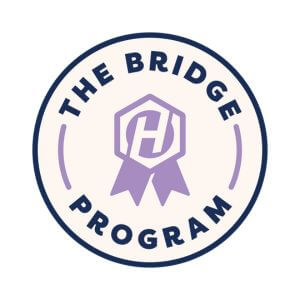Hopebridge Offers Free CEUs and Career Growth for New and Experienced BCBAs
Earning the credentials to become a board certified behavior analyst (BCBA) is a huge accomplishment, but most new – and experienced – BCBAs quickly realize that graduate programs can’t cover everything. Many clinical skills are learned on the job, and it can sometimes feel overwhelming to apply theory to real-world practice—even after years in the role.
That’s why Hopebridge created the Bridge Program. This structured, year-long training and development program is designed exclusively for BCBAs at all experience levels, from new graduates to seasoned clinicians.
At Hopebridge, our clinicians don’t just grow their caseloads, programs like this enable them to grow their skills, networks and BCBA careers through a supportive community dedicated to making a meaningful impact for children and families.
Key Benefits of the Bridge Program for Hopebridge BCBAs
“Literature and our social validity surveys show that many BCBAs feel they are missing education around skills that are necessary for the application of their programs,” Hopebridge Clinical Trainer and BCBA Meg Moore. “It’s one thing to read about scenarios, but another to actually implement everything. The Bridge Program supports them in that learning, leading to higher quality services.”
Here are some of the main benefits BCBAs take away from the Bridge Program:
Common Questions About the Bridge Program
“The Bridge Program gives BCBAs the tools, flexibility and confidence they need to provide the highest quality care—without adding stress to their already busy schedules,” said Meg.
Meg leads our behavior analysts through the Bridge Program, so we turned to her to share some of the most common questions – and answers – from Hopebridge BCBAs and job candidates.
- What is the Bridge Program?
The Bridge Program is a professional development initiative for all BCBAs at Hopebridge. It combines core training topics with individualized learning opportunities to help behavior analysts expand their skills, apply their knowledge and connect with colleagues across the country.
- What topics does the Bridge Program cover?
The Bridge Program was specifically created to address skills that many BCBAs say were not covered in their graduate coursework but are crucial in day-to-day practice. Required topics include subjects like caregiver and family guidance, assent and dissent, compassionate care, writing and executing transition and discharge plans, and patient onboarding preparation.
- Who can join the Bridge Program?
Any BCBA at Hopebridge is able to join the program, regardless of tenure, and it is a requirement for all newly hired BCBAs. Each cohort includes a mix of newly certified BCBAs, experienced clinicians and those new to the Hopebridge team. “We intentionally designed it for all tenures so everyone can grow and share their experiences,” said Meg.
- What is the time commitment for the Bridge Program?
The first six months focus on required clinical topics, while the second half gives BCBAs the chance to select training that best fits their professional interests and needs. The program should work alongside a BCBA’s role, rather than feeling like something “extra” added to their plate.
- How flexible is the Bridge Program?
The program is structured but built with flexibility in mind. If a BCBA has competing priorities, they can take advantage of monthly makeup sessions. “Please don’t let Bridge be something that stresses you out!” Meg urges participants. “We’ll work with your schedule so it benefits you and makes your job easier.”
- Do I earn CEUs?
BCBAs can earn up to 14 free CEUs through the Bridge Program; nearly half of the 32 that are required for recertification every two years. Since the continuing education units (CEUs) are built into the program, participants can focus on clinical work without scrambling to meet requirements later. This is a benefit for all BCBAs, but especially a perk for new BCBAs as they learn to balance their caseloads with certification requirements.
- What are the “flex trainings” and how do I participate in them?
Flex trainings are the continuing education opportunities that BCBAs choose during the second half of the program. This ensures each BCBA’s experience is individualized and relevant to their interests and caseloads. There are numerous options and ways they can be completed—all free of cost to Hopebridge BCBAs! In addition to funding CEUs through Hopebridge’s $500 annual professional development stipend, our BCBAs also have access to free Hopebridge-led trainings via BehaviorLive, thanks to our in-house thought leaders. Hopebridge BCBAs also have access to CASP And BHCOE trainings for CEUs, due to our accreditations.
- Is the program only for new BCBAs?
Not at all! The Bridge Program is intentionally designed for BCBAs at every career stage. Regardless of tenure, the topics the program covers may not have been a focus on our field years ago. More experienced clinicians benefit by deepening their skills, as well as by sharing their perspectives with newer colleagues. It’s a safe space to acknowledge there are always new things to learn. “Even as a trainer with nearly 10 years of experience, I learn something new in every meeting. No two BCBAs do things exactly the same way and we can all learn from each other,” said Meg.
- Where can I access resources from the program?
Every training comes with a slide deck and supplemental job aids, all of which are housed on Hopebridge’s SharePoint. These resources make it easy for BCBAs to take what they learn in Bridge and immediately apply it in their centers.
Find a BCBA Job at Hopebridge
The Bridge program is just one of many reasons why expanding your BCBA career at Hopebridge is different than the experience you will have with other providers. In addition to free CEUs and training, Hopebridge also offers unmatched interdisciplinary collaboration, a BCBA Career Pathway designed for internal advancement, work-from-home days, and no billable hour minimums.
If you’re interested in continuing your career that takes clinical quality and a work-life balance into consideration, consider a job in ABA therapy at Hopebridge. To view open BCBA positions across the country, visit jobs.hopebridge.com.
*Informed consent was obtained from the participants in this article. This information should not be captured and reused without express permission from Hopebridge, LLC. Testimonials are solicited as part of an open casting call process for testimonials from former client caregivers. Hopebridge does not permit clinical employees to solicit or use testimonials about therapeutic services received from current clients (Ethics Code for Behavior Analysts 5.07-5.08; BACB, 2020). Hopebridge does not provide any incentives, compensation, or renumeration for testimonials provided by a former client or client caregiver.

